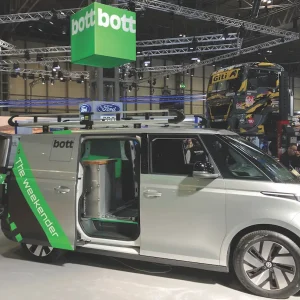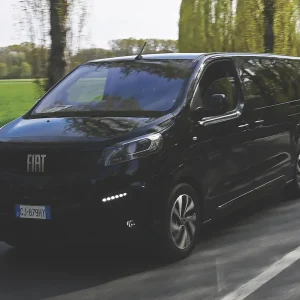 The latest version of Expert is now on sale. Is the entire line-up available?
The latest version of Expert is now on sale. Is the entire line-up available?
Yes and it’s been dramatically extended compared with the previous model. We’ve got ten panel vans — short-wheelbase, long-wheelbase, standard roof and high roof — eight window vans and a couple of chassis platforms. We’re also marketing the Tepee passenger car version.
How are Expert light commercial sales going?
Really well. Our planned order take is running at almost twice what we expected. Partly I think that’s a result of pent-up demand, but partly too I think it’s because the dealer network has really got behind it. Increasing the range has clearly helped too and we’re doing a lot more in terms of marketing than we’ve ever done before. That’s paying off and we’re just hoping that the momentum will continue.
Which is the most popular derivative?
The short-wheelbase standard roof van, although the registration figures are slightly skewed by the fact that it’s the version that dealers are running as demonstrators. As for the choice of diesel, it’s split between 90 bhp and 120 bhp. The 136 bhp engine is just starting to filter through now.
How popular do you expect the long-wheelbase high roof Expert van to be?
I would expect it to take 15 to 20 per cent of total sales volume with the long-wheelbase standard roof doing about the same.
 Any indication that the bigger Experts which are both additions to the range are stealing sales from the lower end of the Boxer line-up?
Any indication that the bigger Experts which are both additions to the range are stealing sales from the lower end of the Boxer line-up?
It’s early days of course, but it’s not happening yet. People perceive them as being very different products. Admittedly we’ve yet to see the long-wheelbase high roof Expert come through in large quantities, but I don’t think Expert will erode the bottom end of the Boxer line-up even when that happens.
Do you propose to offer satellite navigation as standard on Expert and Boxer as your sister company Citroën is doing with Dispatch and Relay?
No. Citroën’s tie-up with Trafficmaster has attracted a lot of attention, but I’m not worried about it and I don’t see the need for us to jump in after them.
Which options are proving to be the most popular among Expert customers?
From the feedback I’m getting from dealers the key things they appear to be ordering are air conditioning, a bulkhead and Bluetooth. The last-named is understandable given that you can get three points on your licence and a more severe fine than previously if you’re caught using a hand-held mobile phone while you’re driving.
ABS is standard on Expert light commercials, but why haven’t you standardised Electronic Stability Programme, especially on the high-roof models?
It comes down to cost. Standardising it would make Expert more expensive and that would put us at a competitive disadvantage. We’d lose customers and our dealers would be up in arms about it. The truth is that van operators don’t seem to want to pay for ESP. We offer it as an option, but the take-up is very low.
How many Experts do you expect to sell this year?
About 6,500. We sold 5,300 in 2006.
 Turning to Boxer, why aren’t you offering the 4.0-tonner in the UK?
Turning to Boxer, why aren’t you offering the 4.0-tonner in the UK?
You need a lot of expert knowledge at dealer level to sell a vehicle in that weight category — expertise our dealers don’t necessarily have — and it’s not a big enough market. When you think about it, if a customer is buying something heavier than a 3.5-tonner, and as a consequence facing a lot more regulatory hassle, then he might just as well go for a 5.5-tonner rather than a 4.0-tonner and carry more weight. Although we’re not offering a 4.0-tonner, what we are doing is marketing a heavy-duty 4 Series Boxer 3.5-tonner with extra high axle weights.
Is the extra high roof Boxer van available yet?
It’s only just gone into production and we’re still assessing whether or not we’re going to launch it here. If we do, we’ll bring in the 17m3 version.
Which Boxer is proving to be the most popular?
We’re seeing a bit of polarisation. At one end of the scale the short-wheelbase standard roof 3.0-tonner is pretty strong, but the 120 bhp long-wheelbase high roof 3.5-tonner is generating a lot of sales too.
Do you think its popularity is being driven by people wanting the biggest van they can get without having to venture over the 3.5-tonne barrier?
Yes. It’s interesting too that buyers are opting for the 120 bhp diesel rather than the 157 bhp alternative. The former gives them a slightly better payload and offers sufficient power for a vehicle of that size.
Which options are Boxer customers selecting?
As with Expert, air conditioning and a bulkhead are both popular choices, but a lot of people are looking for parking aids as well; either a reversing camera or sensors.
What’s the sales split between Boxer van and Boxer chassis cab?
It’s somewhat skewed because we sell a lot of Boxers into the motorhome market and motorhome builders tend to build on chassis cabs. So the split has typically been 50/50. The forecast is that Boxer vans will be slightly stronger this year though, so it’s likely to swing 60/40 in van’s favour.
How many Boxers do you expect to sell this year?
We’re aiming at around 5,300. In 2006 we sold 4,755.
What’s happening with Boxer minibus?
We work with a couple of converters — Kirkham and Red Kite — who take Boxer window vans and turn them into minibuses. They’re developing minibus versions of the latest Boxer model.
Will you launch a Boxer crew van, with a second row of seats and a load area at the back?
That’s a market we want to study further. Anecdotally there appears to be a demand for such a vehicle, but we want to see how strong it is. We’ve just launched a version of Expert Tepee with six seats and a separate area at the back with unglazed sides and solid rear doors.
Will you be introducing a range of ready-to-go-to-work Boxer-based tippers, dropsides and Lutons?
Again, that’s something we’re looking at, but nothing will happen this year.
Moving back down the weight range, how’s the Partner van doing?
Sales show no signs of slowing down despite the fact that it’s no longer a young vehicle. It’s got a new 1.6-litre diesel engine of course at either 75 bhp or 90 bhp — it’s over 30 per cent more fuel-efficient than the engine it replaces — and that helps. I think sales this year will be pretty much in line with last year.
How soon before we see Partner’s successor?
It will appear well into 2008 so we’ll be selling the existing model for a good 12 months yet.
Will the new Partner be at next year’s British Commercial Vehicle Show?
It’s possible, but I don’t know in what form. It might be displayed as a concept vehicle.
Next year will also see the launch of an all-new van to be built in Turkey and developed jointly between PSA (Peugeot and Citroën’s parent company) Fiat and Turkish manufacturer Tofas. It will be slightly smaller than Partner. When will it appear in Britain?
Again, we’ll be talking well into 2008.
How soon before the new 207 Van goes on sale?
It will be at dealerships in July.
Are you completely out of 206 Vans?
We’ve got about three left, so we can’t wait for 207 Van to come along.
How many 206 Vans did you sell in 2006?
966. We’d have done more, but it was made at our Ryton, Coventry plant. Production ceased (Peugeot has of course closed Ryton – SB) and we hadn’t had time to build up sufficient stocks. This year we expect to sell around 1,400 207 Vans. I think there’s some pent-up demand. We’re certainly getting a lot of fleet interest.
Would you consider launching a more stylish version of 207 Van to rival Ford’s Fiesta Sportvan?
It’s something we’re looking at closely. It will give us the opportunity to add value and stimulate sales.
Mitsubishi’s new 4×4 Outlander is sold as a light commercial as well as a car, and the car version is marketed by Peugeot as the 4007. Citroën sells a rebadged Outlander too. Will you be selling a 4007 van?
It’s available from the factory, but initially we’ll be concentrating on the car in the UK. After that we’ll have to see what opportunities there are. Remember that as part of the agreement between the manufacturers we have a fixed volume of 4007s we can sell, so every van we sold would mean one less car.
What’s your strategy so far as alternative fuels are concerned? What’s your view of liquefied petroleum gas (lpg)?
We don’t have any lpg conversions available. I believe lpg is too short a term a solution and its benefits may no longer be around in as little as two years time. The next step so far as we’re concerned is probably a diesel electric hybrid. In the meantime we’ve got highly efficient HDi common rail diesels and particulate filters; and you can run those engines on a 30 per cent biodiesel mix without any modification.

 The latest version of Expert is now on sale. Is the entire line-up available?
The latest version of Expert is now on sale. Is the entire line-up available? Any indication that the bigger Experts which are both additions to the range are stealing sales from the lower end of the Boxer line-up?
Any indication that the bigger Experts which are both additions to the range are stealing sales from the lower end of the Boxer line-up? Turning to Boxer, why aren’t you offering the 4.0-tonner in the UK?
Turning to Boxer, why aren’t you offering the 4.0-tonner in the UK?



